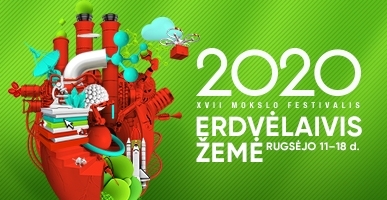Events
The 17th Science Festival ‘Spaceship Earth’
07 09 2020
In implementing the EU Structural Funds project ‘Development and Implementation of the National Science Promotion System’, the Lithuanian Academy of Sciences has become the main agent of the project in organizing the science festival ‘Spaceship Earth’. Together with its partner, the public institution ‘Mokslas ir inovacijos visuomenei’ (Science and Innovation for Society) that organises the festival, the Academy will invite science lovers to participate in the events of the festival that will be held from 11 to 18 September 2020.
Taking into account the unusual situation created by the threat of coronavirus, participants will also be offered remote events, such as live broadcasts from the laboratories of science centres. On the other hand, in order to increase security, the number of participants in the majority of events is limited to 10-30 people.
The festival will take place in 17 cities and districts of Lithuania, and currently the planned number of events already exceeds 320. As usual, priority is given to interactive activities: excursions, visits to research laboratories, and practical activities. Pupils of all ages and anyone interested will enjoy opportunities to construct robots, observe cancer cells and measure bacteria under a microscope, to generate business ideas, observe stars, test virtual rehabilitation methods, model traffic flows, construct wind turbine models, create virtual reality environments, produce sensors, and explore various composite materials. At the Wroblewski Library of the Lithuanian Academy of Sciences, they will hear about the development of writing and see how historical documents are being restored. The country’s most prominent scientists and the members of the Lithuanian Academy of Sciences will teach the participants the secrets of 3D printing, assist them in planning their careers, and stimulate motivation to study. Visitors will learn about cyber security, big data analytics, and deep neural networks; about how mathematical models are used to investigate crime, how ideas translate into IT start-ups, and how sustainable fashion products and other innovative commodities are developed through social media platforms. It goes without saying that the impact of COVID-19 on learners and the education system in general will also be discussed at the 17th ‘Spaceship Earth’ festival.
The planned events cover all fields of science, examine the links between science and art, analyze the processes in society, raise philosophical questions, and so on. As usual, the programme of the science festival reflects the latest and most important trends in science and technology in the world and in Lithuania. It broadens the outlook, helps to understand the essence of change, and encourages pupils to choose a career in research.
Registration for the free events is started at the end of August. More information can be found on the festival website www.mokslofestivalis.eu .
*****
The project ‘Development and Implementation of the National Science Promotion System’ encompasses numerous other activities. From 2019 to 2022, the Lithuanian Academy of Sciences plans to organize 15 informal educational sessions with prominent researchers. These events will be held in various regions of Lithuania, thus contributing to the reduction of the gap between cities and regions in the field of science education. Such events create favourable conditions for pupils from remote areas to get acquainted with scientific progress, latest technologies, Lithuanian researchers and their achievements.
Publishing and promotion of popular science books is another important part of the project. From 2016 to 2019, translations of six popular science books were published, and distributed: The Rise of the Robots by Martin Ford, Cultivating Conscience by Lynn. A. Stout, Gulp: Adventures of the Alimentary Canal by Mary Roach, In 2016–2019, A Beautiful Question: Finding Nature’s Deep Design by Frank Wilczek, The Fourth Revolution by Luciano Floridi, and The Age of Genomes by Steven M. Lipkin and Jon Luoma. Seven more popular science books, three by foreign and four by Lithuanian authors, are to be published before 2022.
For summary of the project ‘Development and Implementation of the National System of Science Popularization, 2016–2022’, see: http://www.lma.lt/eu-sf-projects-2 .
Dr. Rolandas Maskoliūnas, with contribution from EU SF Projects Group, the Lithuanian Academy of Sciences
Translation from Lithuanian by Diana Barnard
